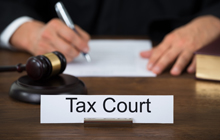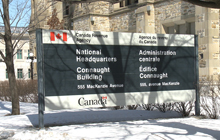Taxpayer sidesteps gross-negligence penalties and $90,000 in taxable income because tax year was statute-barred

As David J Rotfleisch explains, the decision by the Tax Court of Canada in Abbass V The King centred on a bookkeeping error by the taxpayer's accountant
Introduction: Statute-Barred Tax Years & Statute-Barred Tax Audits
 |
David J Rotfleisch, CPA, JD is the founding tax lawyer of Taxpage.com and Rotfleisch & Samulovitch P.C., a Toronto-based boutique tax law corporate law firm. |
Canada's Income Tax Act sets out a "normal reassessment period," after which the Canada Revenue Agency generally cannot reassess a person's taxable income or tax payable. For most individual taxpayers, the normal reassessment period expires three years from the date that the CRA issued the taxpayer's original tax assessment for the taxation year. Once the normal reassessment period for that taxation year has expired, that tax year is statute-barred, which means that the CRA's tax auditors can no longer audit that year's income-tax return or increase that year's tax bill. (Canada's Excise Tax Act contains a similar tax rule, which generally prohibits the CRA from reassessing a GST/HST reporting period "more than four years after" the day that the GST/HST return was filed for that period.)
This tax rule's purpose is to promote some measure of certainty in Canada's tax system. In Tingley v R, [1999] 1 CTC 2177, the Tax Court of Canada explained that the normal tax-reassessment period serves to "provide a window during which the [Canada Revenue Agency] may review and make [a tax reassessment] yet provide the taxpayer who has not made misrepresentations some certainty in their tax affairs."
But, as this quote suggests, the statute-barred tax rule comes with limits. The CRA may reassess an otherwise statute-barred year if, when filing the tax return, the taxpayer (i) committed fraud or (ii) made a misrepresentation attributable to neglect, carelessness, or wilful default. The CRA must, however, prove that the taxpayer committed fraud or made such a misrepresentation.
Yet the CRA's tax auditors have historically reassessed otherwise statute-barred tax years without sufficient evidence that the taxpayer committed fraud or made a misrepresentation attributable to neglect, carelessness, or wilful default. We see yet another example of this practice in Abbass v The King, 2023 TCC 169. The Tax Court consequently allowed the taxpayer's appeal outright — thereby cancelling a tax reassessment that imposed about $92,000 in additional income and about $40,000 in gross-negligence penalties.
The CRA's Power to Reassess an Otherwise Statute-Barred Taxation Year: Subsection 152(4) of Canada's Income Tax Act
Subsection 152(4) of Canada's Income Tax Act permits the CRA to reassess an otherwise statute-barred taxation year under any of the following three conditions:
- The taxpayer filed a waiver allowing the CRA to reassess a statute-barred taxation year: 152(4)(a)(ii).
- The taxpayer made a misrepresentation attributable to neglect, carelessness, or wilful default in filing the return or in supplying information to the CRA: 152(4)(a)(i) [first condition].
- The taxpayer committed fraud in filing the return or in supplying information to the CRA: 152(4)(a)(i) [second condition].
To reassess a statute-barred year under the first condition of subparagraph 152(4)(a)(i), the CRA bears the burden of establishing, on a balance of probabilities, both: (1) that the taxpayer made a misrepresentation; and (2) that the misrepresentation was attributable to neglect, carelessness, or wilful default: Vine Estate v Canada, 2015 FCA 125, at para 24; Papier Domco Inc. v. The Queen, 2011 TCC 441, at para 11.
In other words, the CRA may reassess beyond the normal reassessment period only if it establishes that it is entitled to do so, and the "[Canada Revenue Agency's] entitlement to reassess beyond the normal reassessment period must be established by proving the existence of any of the elements set out in subparagraph 152(4)(a)(i). It is up to the [CRA's tax auditors] to do so.": Sarraf v the Queen, [1994] 1 CTC 2519 at 2522 (Bowman TCJ).
This means that the CRA's tax auditors cannot merely assume that a taxpayer made a misrepresentation attributable to neglect, carelessness, or wilful default. This tax jurisprudence therefore reverses the onus that would otherwise apply when other tax issues are under dispute. For the most part, in Canadian tax disputes, the CRA may make factual assumptions — that is, assume the facts favouring the CRA's position without proving that those facts are true — and the taxpayer bears the initial burden of disproving the CRA's factual assumptions. But the CRA cannot reassess a statute-barred year on this basis.
The burden is flipped when it comes to subparagraph 152(4)(a)(i) of Canada's Income Tax Act. The CRA's tax auditor must prove, on a balance of probabilities, that the taxpayer did indeed make a misrepresentation attributable to neglect, carelessness, or wilful default. The CRA cannot merely assume that the taxpayer made such a misrepresentation.
Yet in Abbass v The King, the CRA did just that.
Abbass v The King, 2023 TCC 169
In Abbass v The King, 2023 TCC 169, the CRA audited the T2 corporate income-tax returns that Mr. Abbass's corporation had filed for its 2013 and 2014 tax years. During the corporate income tax audit, the CRA's tax auditors decided to expand the audit to include Mr. Abbass's personal income-tax return for the 2010 taxation year, which was already statute-barred.
The CRA tax auditor's decision was based on an apparent discrepancy between the income that Mr. Abbass had reported on his 2010 personal income tax return and the due-to-shareholder amount that his corporation had reported on the balance sheet accompanying its 2010 corporate income tax return. The corporate income tax return indicated that Mr. Abbass had lent over $92,000 to his corporation in 2010. But, according to the CRA's tax auditor, the income reported on Mr. Abbass's personal income tax returns indicated that Mr. Abbass didn't have the financial resources to make a $92,000 loan. The CRA tax auditor therefore concluded that Mr. Abbass had failed to report $92,000 in income for the 2010 tax year.
Although the CRA tax auditor never bothered to verify whether the corporate income tax returns had mistakenly reported a $92,000 loan from Mr. Abbass, or whether $92,000 had ever passed from Mr. Abbass's bank account to the corporation's bank account, the tax auditor concluded that, when filing his 2010 income-tax return, Mr. Abbass had made a misrepresentation attributable to neglect, carelessness, or wilful default.
This, concluded the CRA tax auditor, justified reassessing Mr. Abbass's otherwise statute-barred 2010 tax year under subparagraph 152(4)(a)(i) of Canada's Income Tax Act. As a result, the CRA tax auditor reassessed Mr. Abbass's 2010 taxation year, thereby increasing his taxable income by $92,000. The CRA tax auditor also levied about $40,000 in gross-negligence penalties.
Mr. Abbass's tax litigation lawyer appealed to the Tax Court of Canada. During the Tax Court hearing, when cross-examining the CRA tax auditor, Mr. Abbass's lawyer elicited an admission that the auditor had based the entire tax reassessment on the $92,000 due-to-shareholder entry on the balance sheet accompanying the corporation's 2010 T2 income-tax return. The CRA had no proof of a $92,000 withdrawal from Mr. Abbass's personal bank account in 2010, nor did the CRA have any proof of $92,000 deposit into the corporation's bank account in 2010.
Moreover, the CRA's sole evidence for the taxpayer's misrepresentation consisted of circumstances that occurred about three years after Mr. Abbass had filed his 2010 income-tax return — in particular, events that occurred during the 2013 and 2014 tax years, which the CRA had uncovered when auditing Mr. Abbass's corporation. In addition, Mr. Abbass's own accountant testified that the $92,000 due-to-shareholder entry stemmed from his own bookkeeping error.
After hearing this evidence, the Tax Court concluded that the CRA had failed to demonstrate that Mr. Abbass had made a misrepresentation attributable to neglect, carelessness, or wilful default when he filed his 2010 income tax return. The CRA could produce no evidence of unreported income beyond the $92,000 entry on the balance sheet accompanying the corporation's T2 income-tax returns. The taxpayer's accountant explained that this entry stemmed from a bookkeeping error, for which the taxpayer had no part.
Moreover, the CRA cited events occurring in 2013 and 2014, which had no bearing on Mr. Abbass's state of mind at the time that he filed his 2010 income-tax return. Hence, not only did the taxpayer disprove the CRA's allegation of unreported income, but the CRA reassessed a statute-barred year without warrant. The Tax Court consequently allowed the taxpayer's appeal — cancelling Mr. Abbass's 2010 tax reassessment, allowing him to dodge about $92,000 in fictitious additional income, and about $40,000 in unjustified gross-negligence penalties.
The statute-barred rule demonstrates why Canadian taxpayers should file income-tax returns every year. For most taxpayers, the normal reassessment period expires three years from the date that the CRA issued the taxpayer's original tax assessment for the taxation year. (The normal reassessment period is four years for some taxpayers, such as corporations other than Canadian-controlled private corporations (CCPCs)). So, if the CRA doesn't issue a tax assessment for a particular tax year, that year will never be statute-barred.
An income-tax return will cause the Canada Revenue Agency to issue a notice of assessment, which will start the clock on the three-year normal reassessment period. If you don't file an income tax return, the CRA won't assess you for that tax year, and that year will consequently remain vulnerable to a CRA tax audit at any time.
David J Rotfleisch, CPA, JD is the founding tax lawyer of Taxpage.com and Rotfleisch & Samulovitch P.C., a Toronto-based boutique tax law corporate law firm and is a Certified Specialist in Taxation Law who has completed the CICA in-depth tax planning course. He appears regularly in print, radio and TV and blogs extensively.
With over 30 years of experience as both a lawyer and chartered professional accountant, he has helped start-up businesses, cryptocurrency traders, resident and non-resident business owners and corporations with their tax planning, with will and estate planning, voluntary disclosures and tax dispute resolution including tax audit representation and tax litigation. Visit www.Taxpage.com and email David at david@taxpage.com.
Read the original article in full on Tax Law Canada. Author photo courtesy Rotfleisch & Samulovitch P.C. Top image credit: Pixabay.









(0) Comments